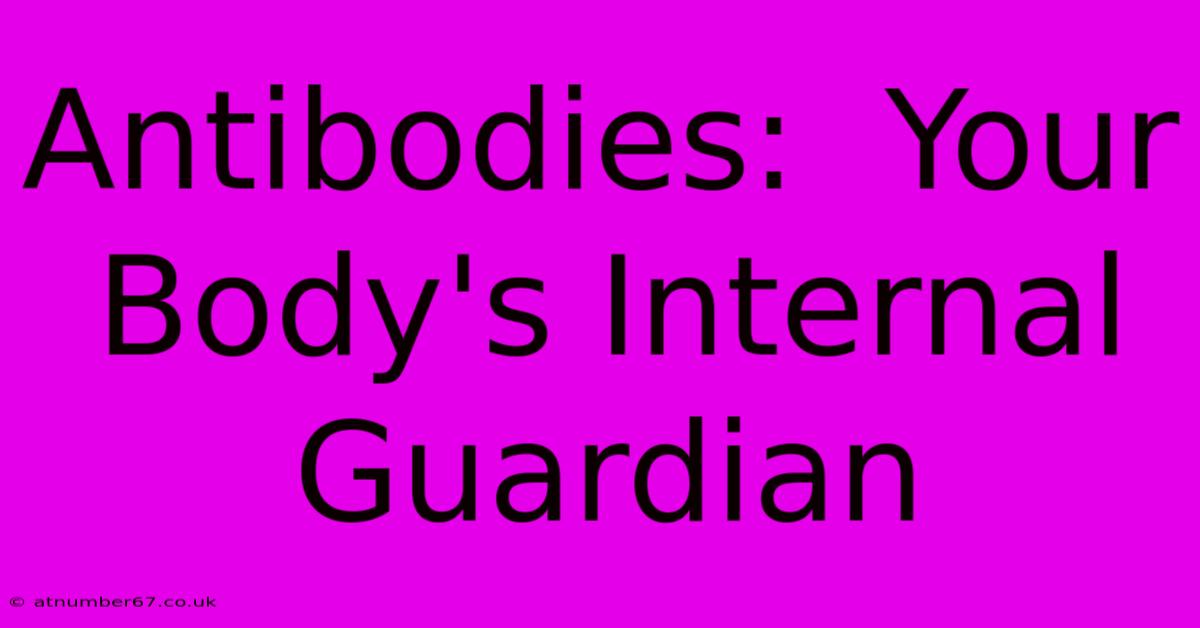Antibodies: Your Body's Internal Guardian

Table of Contents
Antibodies: Your Body's Internal Guardian
Antibodies, also known as immunoglobulins (Ig), are specialized proteins produced by the body's immune system to identify and neutralize harmful foreign substances, known as antigens. These antigens can be anything from bacteria and viruses to toxins and even pollen. Understanding antibodies and their role in protecting your health is crucial for appreciating the complexity and power of your immune system.
What are Antibodies and How Do They Work?
Antibodies are Y-shaped molecules with two identical antigen-binding sites. This unique structure allows them to precisely target specific antigens. When an antigen enters the body, it triggers a complex immune response. This response involves the activation of B cells, a type of white blood cell. These B cells then differentiate into plasma cells, which are antibody factories, churning out millions of antibodies specifically designed to bind to the invading antigen.
The Different Classes of Antibodies
There are five main classes of antibodies, each with its unique role and function:
- IgG: The most abundant antibody in the blood, IgG provides long-term immunity and can cross the placenta to protect the developing fetus.
- IgM: The first antibody produced during an infection, IgM is crucial for initiating the immune response.
- IgA: Found in mucous membranes (such as those lining the respiratory and digestive tracts), IgA protects against pathogens entering the body through these areas.
- IgD: Its precise function remains under investigation, but it's believed to play a role in B cell activation.
- IgE: Primarily involved in allergic reactions and parasitic infections, IgE triggers the release of histamine and other inflammatory mediators.
The Antibody-Antigen Binding Process: A Targeted Attack
The remarkable specificity of antibodies is due to their antigen-binding sites. These sites are shaped to perfectly complement the specific molecular structure of the target antigen. This lock-and-key mechanism ensures that antibodies only bind to their intended targets, preventing them from harming healthy cells. Once bound, antibodies can neutralize the antigen in several ways:
- Neutralization: Antibodies can block the antigen's ability to infect cells or cause damage.
- Opsonization: Antibodies coat the antigen, marking it for destruction by phagocytes (cells that engulf and digest foreign particles).
- Complement Activation: Antibodies can trigger the complement system, a cascade of proteins that enhance the immune response and lead to the destruction of the antigen.
- Antibody-Dependent Cell-Mediated Cytotoxicity (ADCC): Antibodies bind to infected cells, marking them for destruction by natural killer (NK) cells.
Antibodies and Immunity: Building a Strong Defense
The production of antibodies is a cornerstone of adaptive immunity, the body's ability to mount a targeted response against specific pathogens. This acquired immunity can be:
- Naturally acquired: Developed through exposure to an infection.
- Artificially acquired: Achieved through vaccination. Vaccinations introduce a weakened or inactive form of the pathogen, stimulating the immune system to produce antibodies without causing illness.
Maintaining a healthy immune system is crucial for effective antibody production. A balanced diet rich in fruits, vegetables, and whole grains, regular exercise, adequate sleep, and stress management are essential for supporting a robust immune response.
Antibodies in Diagnosis and Treatment
Antibodies have revolutionized medical diagnostics and treatment. They are used in:
- Diagnostic tests: Many diagnostic tests, such as ELISA and immunofluorescence, rely on antibodies to detect specific antigens in blood or other samples. These tests are critical for diagnosing various infectious diseases and other health conditions.
- Targeted therapies: Monoclonal antibodies, which are laboratory-produced antibodies targeting specific antigens, are used to treat a wide range of diseases, including cancer and autoimmune disorders.
In conclusion, antibodies are indispensable components of the body's defense system. Their ability to specifically target and neutralize harmful substances makes them essential for maintaining health and combating disease. Understanding their functions and mechanisms highlights the remarkable complexity and sophistication of the human immune system.

Thank you for visiting our website wich cover about Antibodies: Your Body's Internal Guardian. We hope the information provided has been useful to you. Feel free to contact us if you have any questions or need further assistance. See you next time and dont miss to bookmark.
Featured Posts
-
Escape The Ordinary Son And Dad Barbering
Apr 12, 2025
-
Mae Hong Sons Unique Culture A Fascinating Journey
Apr 12, 2025
-
Sketch Age The Beauty Of Sketching Revealed
Apr 12, 2025
-
Virat Kohlis Net Worth A Look At His Assets
Apr 12, 2025
-
A Tradition Of Excellence Son And Dad Barbers
Apr 12, 2025
